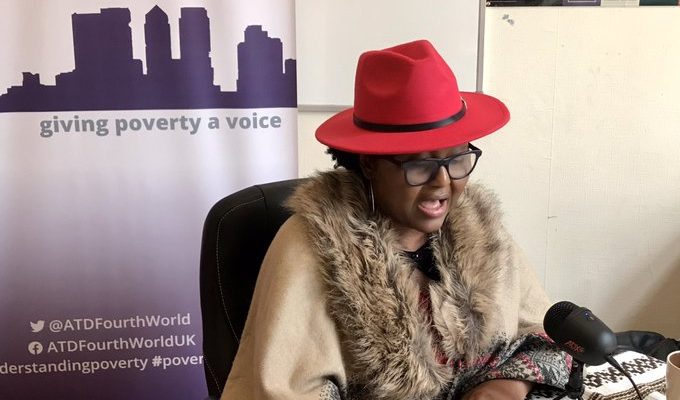We Would Do Anything for Our Children

Lareine Mouoguia is an activist with ATD Fourth World in the UK. Last year she spoke on behalf of ATD at Royal Holloway, University of London. During Covid, families in poverty find themselves in an impossible situation with no good options. Systems set up to support families, Ms. Mouoguia explains, are often not helpful. At times, they make things even worse.
Life is more expensive under Covid
As a mother, you want to be a good mum, but when you’re in poverty, society is not providing you with what you need. Because of the pandemic, many children are not getting free school meals anymore. Because the children are stuck at home, we have to spend much more money on food. [And] we have spent so much more on heating because with the kids home all the time, you can never put the heat down.
Swallowing your pride just to get by
Some meals are offered by charities put in place to assist families—but only if you would first answer questions that are so invasive and degrading and humiliating that you want to run away.
The kids have nothing to do, so they are always on the phone. Pay-as-you-go bundles to get internet on the phone cost a lot of money. One mother says:
- “For my daughter’s homework, I had to swallow my pride to ask our neighbour if we could piggyback onto his network from our flat. He agreed—but I feel like I don’t want to rely too much on him.”
Sometimes you feel like you have to do something and at the same time you feel like you shouldn’t be doing it. Because of the situation, you are forced to feel shameless.
Consequences of isolation and shame
Frustration builds up in children. All year long, they’re not seeing their friends, they’re not entertained. The knots of anger just build up inside them. That takes so much energy from the parents.
I worry a lot about our children being idle. The devil finds work for idle hands. With nowhere to go and no choices, they feel forgotten. They lose hope.
They are ashamed to be broke and to feel useless. Drugs seem hidden—but our children know where they are sold. Idleness confuses our children’s mood and affects their hearts. It makes drugs seem cool.
Poverty is not neglect
When you are raising children in poverty in this country, there is a big problem. You might be going through a hard time. And you feel ashamed to go and ask for help. So then when the school sees that you are struggling, they call and start talking about child protection. But this is wrong!
They think a parent who doesn’t have the money to buy new socks is neglecting the child by sending them to school with socks of two different colours. But that is not neglect! When you are poor, of course you might have different socks or you might look dirty. But that just means the parents need support.
- Many parents, when they struggle, they do ask social services—but they usually don’t get help. It’s almost like social services are refusing to help the parent on purpose so that afterwards they can come and say, “You are neglecting your child”.
Associating poverty with negligence is so inhuman. This is wrong.
Advice for social workers
Please don’t judge us. We want you to come to us as a human being and to see what we are going through.
Please understand the difference between poverty and negligence. We would do anything for our children; we just need help.
A friend once told her social worker that she was not coping, but in reality, she was just tired and drained. What happened next was that her social worker reported her as an unfit mother and she was reported and had to go to court.
My social worker has said, “Sorry, we have no funding, my hands are tied”. Please can I know: why are you here if you can’t help me? If you can’t give any support, the situation will deteriorate. A lot of us are left abandoned and good parents and children pay the ultimate price.
Read the full article on Ms. Kenmodge’s statement at Royal Holloway, University of London symposium titled “Inequality and Rights: Contemporary Challenges in the Child Protection & Family Justice Systems before and during the Pandemic”.
Find out more on ATD in the United Kingdom
More on ATD Fourth World’s protecting families around the world
More on ATD Activists with a lived experience of poverty

